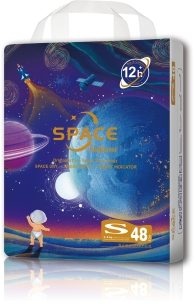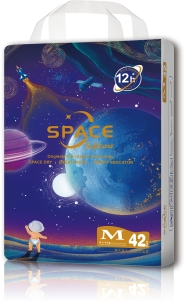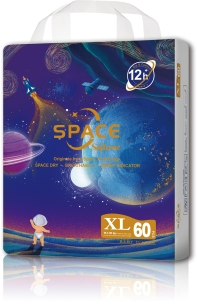How Many Newborn Diapers Do You Need?
November 26,2024
Becoming a parent is a life-changing experience, and with it comes a myriad of questions, one of which is often about the practicalities of diapering a newborn. You might find yourself wondering, "How many newborn diapers do I need?" This question is more than just about numbers; it's about being prepared, ensuring comfort, and managing the unexpected realities of caring for a new baby. In this guide, we'll delve into the factors that influence diaper usage, provide a rough estimate, and discuss related topics to help you navigate the diapering journey with confidence.
The Newborn Diaper Conundrum
The Reality of Newborn Diaper Usage
Newborns are notorious for their frequent diaper changes. Their tiny tummies and developing digestive systems mean that they may need a diaper change every two to three hours, or even more often. This can be a shock for new parents who are used to the more predictable routines of older children.
The Importance of Being Prepared
Understanding the frequency of diaper changes is crucial for being prepared. Having enough diapers on hand can prevent last-minute trips to the store and ensure that your baby is always comfortable and clean.
Estimating Diaper Needs
Daily Diaper Changes
On average, a newborn baby will need about 8 to 12 diaper changes per day. This number can vary based on the baby's weight, feeding habits, and individual needs.
Weekly and Monthly Estimates
Multiplying the daily changes by the number of days in a week and a month gives us a rough estimate of 56 to 84 diapers per week and 224 to 336 diapers per month. It's a good idea to stock up on at least a month's worth of diapers to start with.
Size Considerations
Newborn diapers are specifically designed for the first few weeks of a baby's life. As your baby grows, you'll need to transition to size 1 diapers. It's important to monitor your baby's growth and adjust your diaper stock accordingly. For a more tailored approach, consider the size recommendations from Softcare Diapers:
- Softcare Diapers Size S: Suitable for babies weighing 3-6 kg.
- Softcare Diapers Size M: Suitable for babies weighing 6.1-9 kg.
- Softcare Diapers Size L: Suitable for babies weighing 9.1-15 kg.
- Softcare Diapers Size XL: Suitable for babies weighing 15.1-25 kg.
These size recommendations ensure a comfortable and secure fit, reducing the risk of leaks and promoting healthy skin.
|
Softcare Diapers Size S |
Softcare Diapers Size M |
Softcare Diapers Size L |
Softcare Diapers Size XL |
Factors Influencing Diaper Usage
Feeding Type
Breastfed babies tend to have more frequent bowel movements compared to formula-fed babies. This can influence the number of diapers needed, especially when considering the number of wet changes.
Sleep Patterns
Newborns often have irregular sleep patterns, which can affect diaper changes. Nighttime diapers that are more absorbent can reduce the need for frequent changes and allow for longer stretches of sleep.
Baby's Health
A baby's health can also impact diaper usage. Diarrhea or other gastrointestinal issues can increase the frequency of changes, requiring more diapers.
Stocking Up on Diapers
Bulk Buying
Many parents opt to buy diapers in bulk to save money and reduce the need for frequent shopping trips. However, it's important to consider storage space and the rate at which your baby will outgrow the diaper size.
Subscription Services
Diaper subscription services offer a convenient way to ensure a steady supply of diapers without the need for constant restocking. These services often allow you to choose the size and frequency of deliveries.
Environmental Considerations
Disposable vs. Cloth Diapers
The debate between disposable and cloth diapers is an important one, with environmental impact being a significant factor. Disposable diapers are convenient but contribute to landfill waste, while cloth diapers require more effort in terms of washing but are more eco-friendly.
Biodegradable Options
For those concerned about the environment, biodegradable or compostable diaper options are available. These can be a good compromise between the convenience of disposables and the environmental benefits of cloth.
The Potty Training Connection
Anticipating Potty Training
As your baby grows, the number of diapers needed will decrease as you transition towards potty training. Understanding the signs of readiness for potty training can help you plan for the gradual reduction in diaper usage.
Nighttime Diaper Usage
Even after daytime potty training, nighttime diaper usage may continue for some time. It's important to have a stock of diapers on hand for these situations.
Conclusion
The question of how many newborn diapers you need is complex and influenced by many factors. The key is to be prepared, understanding that the needs of your baby will change over time. By considering the daily, weekly, and monthly estimates, as well as the factors influencing diaper usage, you can ensure that you're ready for the diapering demands of a newborn. Remember, the journey from newborn to potty-trained child is a marathon, not a sprint, and having a plan in place for diaper needs will make this journey smoother.



